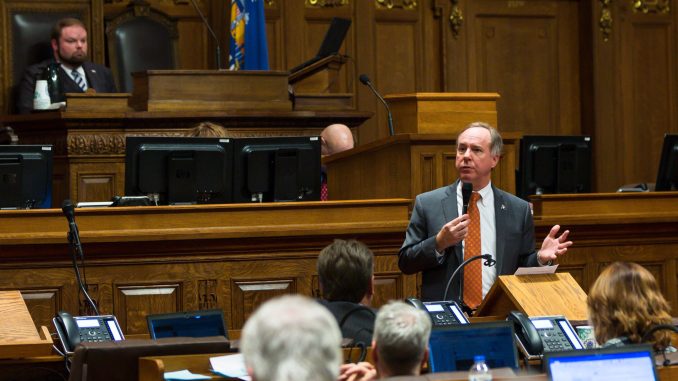
Napoleon said that to master the art of war, you must “read over and over again” the campaigns of history’s most successful generals.
The same advice applies if you want to master the art of legislating: You must study the strategies of the most successful legislators.
To that end, any lawmaker that wants to thwart diversity, equity and inclusion (DEI) programs needs to study the skillful maneuvers of Robin Vos, the speaker of the Wisconsin State Assembly. As National Review reports, Vos has succeeded—in a divided government, where Republicans control the legislature, while a Democrat holds the governor’s mansion—in destroying DEI programs throughout the University of Wisconsin system, which includes 13 campuses.
Here’s how he did it.
First, he surveyed the battlefield. Behind him and the Republican-controlled legislature was a supportive electorate that wanted him to abolish DEI on college campuses. In front of him were university administrators and a governor who were deeply entrenched in their support for DEI programs.
A frontal assault—a bill simply abolishing or defunding DEI programs—would go nowhere unless Vos could shift them out of their entrenchments.
Like a smart general, Vos knew that to do that he’d have to threaten something even more valuable to them than their DEI programs. But campus zealots seem to love nothing more than to put students into identity boxes and then segregate and discriminate on that basis. They want to do these things with an almost religious zeal.
Yet Vos figured out that they love something even more; namely, money.
He knew that campus zealots would never willingly destroy their own DEI apparatus. But he also knew that they would never say no to giving themselves a pay raise. So, he pitted those two interests against each other.
He passed a budget that included pay raises for university employees and funding for new buildings. The budget also eliminated all DEI positions and cut $32 million from the university system’s budget—the amount that the system spent on DEI programs.
The governor, Tony Evers, howled about the bill, but Vos had outflanked him. Evers couldn’t sacrifice raises for everyone in the system to save DEI programs, even as much as he cherished them. So, Evers surrendered and signed the bill.
He did, however, line-item veto the part of the bill that eliminated the DEI positions. That meant that the university system could redeploy $32 million from other programs to keep its beloved DEI staffers paid.
But Vos had anticipated that move.
Before the pay raises could take effect, a committee in the legislature had to approve them. Vos told the University of Wisconsin that the pay raises would be approved once the system voluntarily abandoned its DEI programs.
As he had done to Evers, Vos had outflanked University of Wisconsin President Jay Rothman. Despite Rothman’s support for DEI, he knew that his position was untenable, so he, too, surrendered and agreed to cut the DEI programs.
Specifically, he agreed that the university system would freeze all DEI hiring, move all DEI staffers to other positions, stop using diversity statements in student applications, and stop discriminating based on race, sexuality, and other identity characteristics in faculty hiring.
Vos got even more.
Rothman agreed that the Madison campus would create a professorship for the study of conservative thought and that all campuses would offer a course on free speech for undergraduates. Finally, the university system would elevate academic merit by automatically giving admission to all Wisconsin students who graduated in the top 5% of their high-school classes, regardless of his or her race.
Despite Rothman’s agreement, the deal still had to make it through the liberal-controlled university Board of Regents, which rejected it. The regents thought that Vos’ attack was just a feint, and that he wasn’t serious about blocking the pay raises and building funds.
But Vos’ attack was serious.
“We are not changing one thing in this deal,” Vos said, before inviting the regents to walk away from it. They surrendered four days later and approved the whole deal.
Their love of money trumped their commitment to DEI. Vos saw this, and like an expert general, exploited it to secure an astonishing victory. It was a victory all the more astonishing, given that Vos’ Republican Party does not have complete control of the state government.
That was the art of legislating at its finest. Opponents of DEI in other statehouses should take note and—like Napoleon did of history’s greatest commanders—study and emulate it.
Have an opinion about this article? To sound off, please email letters@DailySignal.com, and we’ll consider publishing your edited remarks in our regular “We Hear You” feature. Remember to include the URL or headline of the article plus your name and town and/or state.
